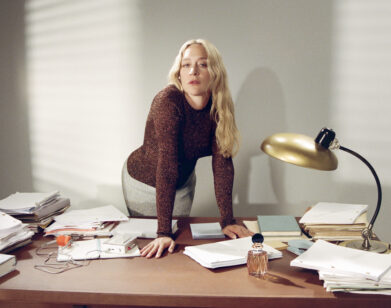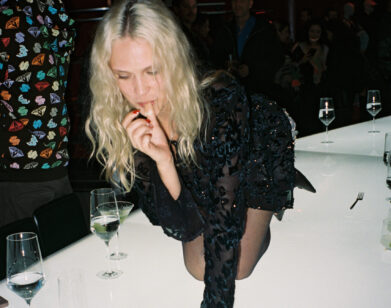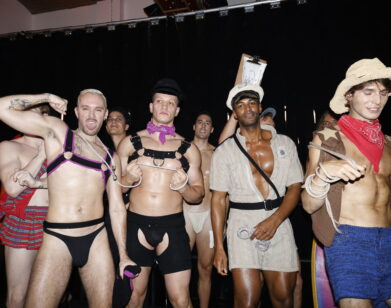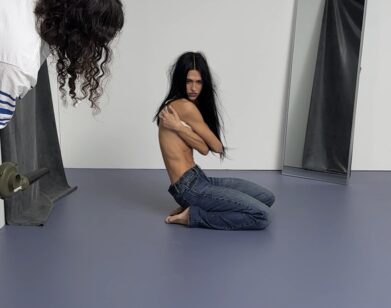New Again: Marianne Faithfull
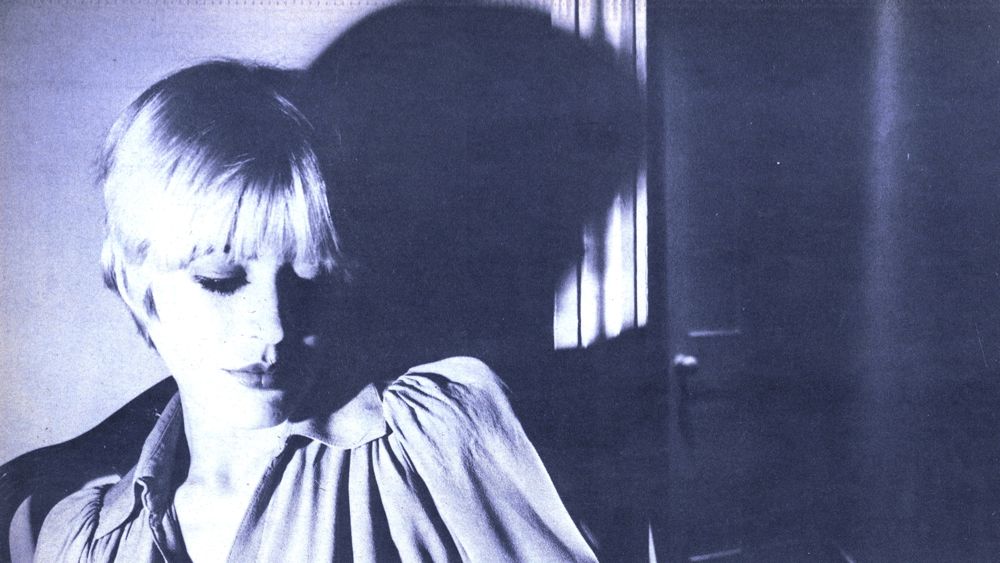
Rock-‘n’-roll has long been part of Saint Laurent’s history: since Bianca Jagger wore her YSL Le Smoking jacket for her 1971 wedding to Mick Jagger. In 2013, the rebranded house revived its rock roots with a new series titled “The Saint Laurent Music Project,” featuring iconic musicians (Kim Gordon, Courtney Love, Chuck Berry, BB King etc) self-styled in Saint Laurent staples. Earlier this week, Saint Laurent announced the newest addition to the series: ’60s beauty Marianne Faithfull.
When we first interviewed Marianne Faithfull in July of 1974, the British actress and singer was going through a particularly vulnerable time. After splitting up with Mick Jagger, with whom she had had an infamous four-year love affair, in 1970, Faithfull had ceased to be a functioning drug addict, and spent two years homeless on the streets of London. She’d lost custody of her son and attempted suicide. In 1974, it seemed as if things were looking up: Faithfull had returned to the stage and the recording studio, and was engaged to her old friend Oliver Musker. This period of respite, however, didn’t last long. Faithfull never married Musker and returned to heroin.
Now, with her drug addiction long behind her, Faithful has assumed her place in popular culture as a sultry-voiced jazz singer: an icon of the past who finally has a future.
Forever Faithfull
By Peter Lester
Marianne Faithfull: ‘60s pop idol; Mick Jagger’s first public love; admonished and busted for drug use; and now returning to the English stage. Marianne talks to Interview in London over a sumptuous dinner prepared by Pauline Fordham, top ‘60s designer.
PETER LESTER: Is it really Faithfull?
MARIANNE FAITHFULL: Yes, my father is Professor Robert Faithfull.
PAULINE FORDHAM: And she’s Miss Faithless!
FAITHFULL: That’s why Andrew Oldham made that record, without even bothering to find out if I could sing: when John Dunbar told him my name, Andrew said, “God! That’s a commercial names, she’s got a really commercial face, and that name, let’s make a record.”
LESTER: Where did he find you?
FAITHFULL: At a party. My first job was singing at the Hammersmith Odeon. It was 10 years ago, but I can’t remember who I was performing with. I was a sort of anti-climax after two hours of heavy rock-‘n’-roll. Seventeen years old in a white dress. It was the first time that I got applause. Wonderful, that noise in my ears. I knew just what I wanted to do—just get clapped at for the rest of my life.
LESTER: So you left school?
FAITHFULL: Well, you know the first objective is to get out of your hometown, second objective, get it together in the capital. The awful thing about making it, is that you’d feel you’d be important. It would matter what you did.
LESTER: If it doesn’t matter to you now, why should it ever?
FAITHFULL: It matters a little bit to my friends; they don’t want me to die, they don’t want me to be a fool.
FORDHAM: We saw you back over a long desert.
FAITHFULL: Exactly. Till recently people were being nice to me because they felt that I’d had a tough time. John Dunbar and I were talking about this London party scene; all that clique of aristos that always go to parties. They always feel they have to have a Bohemian element: one tame pusher, one tame popstar, somebody’s who’s just a sort of artist, like John Dunbar.
LESTER: Why do you think you get invited?
FAITHFULL: I’m a tame actress. But I don’t go anymore. I get tired now that I’m entertaining day and night professionally. I think the only reason for going to a party is to pick up a good lay. When you’ve got a permanent boyfriend it’s rather spoilt. Because the fun of a party is to flirt with everyone. I like flirting.
LESTER: Why don’t you make any more records?
FAITHFULL: I’m going to make an album this year.
LESTER: What about Mick, where did you meet him?
FAITHFULL: I met him long before I went out with him. Mick wasn’t really a swinger. I was 19. I didn’t mean to fall in love.
LESTER: What kind of effect did he have on your career?
FAITHFULL: Well, it’s always a good idea to get yourself a famous, rich, and groovy young man. That’s one of the best-known methods of furthering your career.
LESTER: You both got busted, didn’t you?
FAITHFULL: That’s what changed public opinion. I always though it was quite an honor to be busted. The reason we got busted was that the News of the World started a campaign on the grounds that Mick and Keith were important figures to the youth, and what they did mattered. The editor of The Times wrote a letter that swung the whole thing because he pointed out to the public that it didn’t matter what the Rolling Stones took or take. The nice thing about us lot is that what we do is of no consequence. We don’t do things that are important; we spend our lives doing things which are not important. That’s what’s nice about us, we’re not pompous. We never do anything very bad that’s gonna change the world. We’re not serious, we’re butterflies. We live for a day.
LESTER: How did it end?
FAITHFULL: [quietly] I left him. I’d tried to leave him several times but he always got me back. He got me back by writing that song “Wild Horses,” what girl could resist that? Certainly not me, mate. But when you split from someone, it doesn’t have to mean that you don’t love them anymore, you realize that the period of that particular romance is over. One always has to get out before one gets kicked out.
LESTER: Do you choose the stage in preference to the movies?
FAITHFULL: I suppose I do, I don’t know why. It’s a bit passé. I want to do movies, but I want to do something that’s good. I don’t want to make any more films until I feel that I’m ready for it.
LESTER: What do you foresee for the future?
FAITHFULL: Good work, and a very elegant life. I believe you get what you want. If you analyze the bad times you find that it’s because you wanted to have a bad time… I like my work, but my life always comes first. I always wanted to have a beautiful life, and the way to do it is in show business.
Subsequent to this interview, Marianne took on a starring role in The Collector and simultaneously announced her marriage to long-term friend Oliver Musker. Their photos were featured on the front pages of all the national newspapers, which probably annoyed the attractive Mr. Musker, who hates publicity. I immediately got on the phone to Marianne.
LESTER: I see you’ve decided to marry Oliver; can I have an instant quote for Interview?
FAITHFULL: That’s easy. I have to be able to love somebody except myself and the theater, and I’ve decided to love Oliver. He’s worth it.
Formal congratulations for their May wedding, and let’s hope that Mrs. Musker remains Faithfull.
THIS ARTICLE INTIALLY APPEARED IN THE JULY 1974 ISSUE OF INTERVIEW.
New Again runs every Wednesday. For more, click here.


